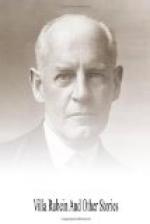“Come with me,” he said. “It doesn’t do to neglect the Press; you can see the possibilities. It’s one of the few countries left. If I once get this business started you don’t know where it’s going to stop. You’d have free passage everywhere, and whatever you like in reason.”
I answered as rudely as I could—but by no means as rudely as I wanted—that his scheme was mad. As a matter of fact, it’s much too sane for me; for, whatever the body of a scheme, its soul is the fibre of the schemer.
“Think of it,” he urged, as if he could see into me. “You can make what you like of it. Press paragraphs, of course. But that’s mechanical; why, even I could do it, if I had time. As for the rest, you’ll be as free—as free as a man.”
There, in five words of one syllable, is the kernel of this fellow Pearse—“As free as a man!” No rule, no law, not even the mysterious shackles that bind men to their own self-respects! “As free as a man!” No ideals; no principles; no fixed star for his worship; no coil he can’t slide out of! But the fellow has the tenacity of one of the old Devon mastiffs, too. He wouldn’t take “No” for an answer.
“Think of it,” he said; “any day will do—I’ve got a fortnight.... Look! there she is!” I thought that he meant Pasiance; but it was an old steamer, sluggish and black in the blazing sun of mid-stream, with a yellow-and-white funnel, and no sign of life on her decks.
“That’s her—the Pied Witch! Do her twelve knots; you wouldn’t think it! Well! good-evening! You’d better come. A word to me at any time. I’m going aboard now.”
As I was being ferried across I saw him lolling in the stern-sheets of a little boat, the sun crowning his straw hat with glory.
I came on Pasiance, about a mile up the road, sitting in the hedge. We walked on together between the banks—Devonshire banks, as high as houses, thick with ivy and ferns, bramble and hazel boughs, and honeysuckle.
“Do you believe in a God?” she said suddenly.
“Grandfather’s God is simply awful. When I’m playing the fiddle, I can feel God; but grandfather’s is such a stuffy God—you know what I mean: the sea, the wind, the trees, colours too—they make one feel. But I don’t believe that life was meant to ‘be good’ in. Isn’t there anything better than being good? When I’m ‘good,’ I simply feel wicked.” She reached up, caught a flower from the hedge, and slowly tore its petals.
“What would you do,” she muttered, “if you wanted a thing, but were afraid of it? But I suppose you’re never afraid!” she added, mocking me. I admitted that I was sometimes afraid, and often afraid of being afraid.
“That’s nice! I’m not afraid of illness, nor of grandfather, nor of his God; but—I want to be free. If you want a thing badly, you’re afraid about it.”
I thought of Zachary Pearse’s words, “free as a man.”




